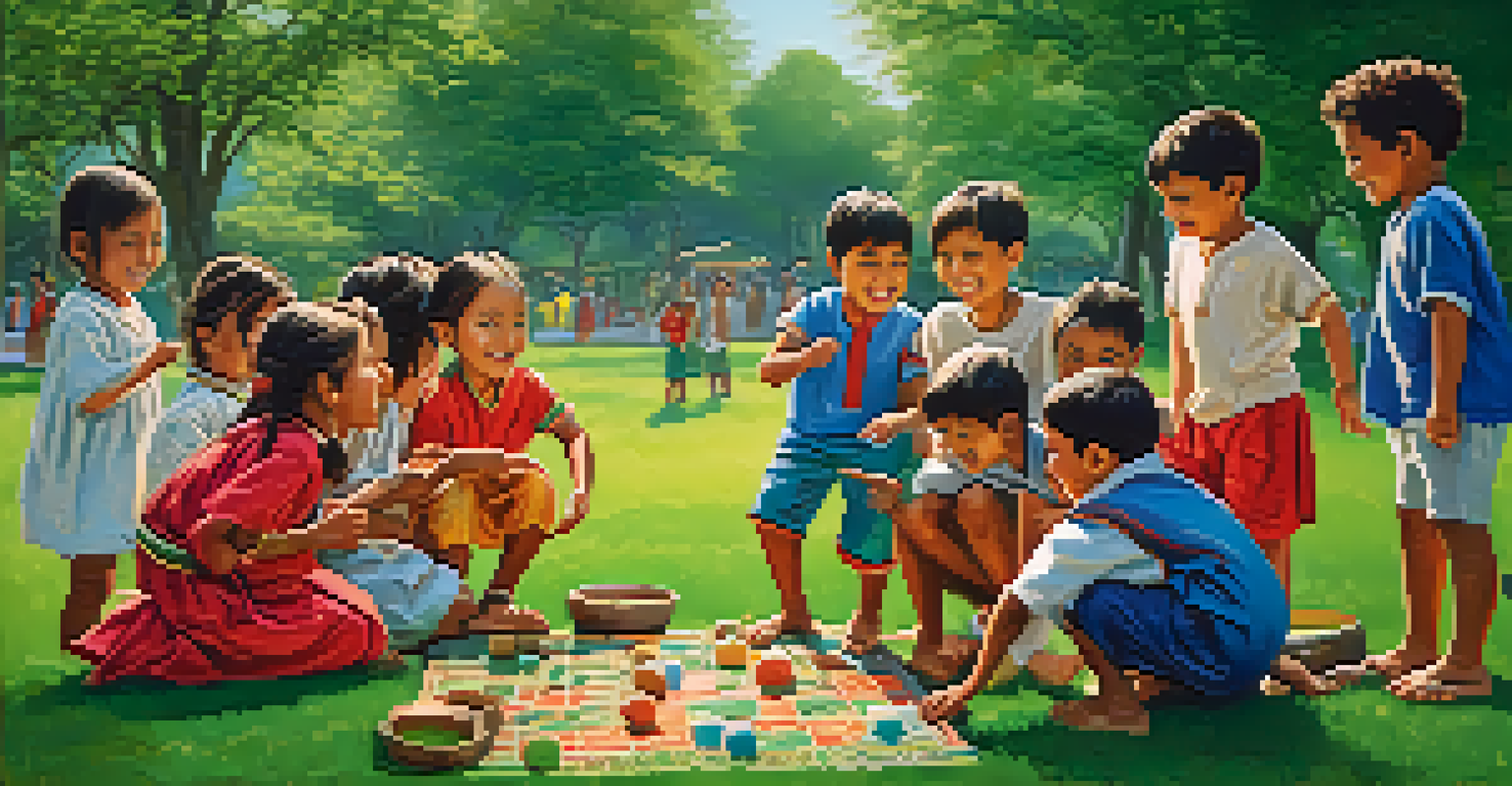The Spiritual Significance of Games and Play Activities

Games as a Reflection of Life's Journey
Games often mirror the ups and downs of life, providing a unique lens through which we can explore our experiences. Just as in life, players face challenges, make choices, and learn from their mistakes. This reflection creates a space for self-discovery and personal growth, allowing us to see our strengths and weaknesses in a playful context.
Play is the highest form of research.
For example, consider a board game where players navigate obstacles to reach a goal. Each setback can symbolize real-life challenges, teaching us resilience and adaptability. This analogy helps us comprehend that while losing a game can be disappointing, it also offers invaluable lessons that can be applied beyond the playing field.
Moreover, these experiences foster empathy as we learn to understand others' perspectives during gameplay. Whether collaborating or competing, games encourage us to acknowledge our interconnectedness, highlighting that we are all part of a larger journey.
The Role of Play in Spiritual Awakening
Play is not just for children; it's a vital component of spiritual awakening for individuals of all ages. Engaging in playful activities can dissolve barriers, allowing us to connect with our inner selves and the world around us. This connection often leads to moments of clarity and insight that are crucial for spiritual growth.

Take, for instance, the concept of 'flow' in play, where individuals lose track of time and become fully immersed in an activity. This state of being can foster creativity and innovation, providing a fertile ground for spiritual exploration. As we let go of our inhibitions during play, we often discover deeper truths about ourselves and our place in the universe.
Games Reflect Life's Journey
Games provide a playful context for self-discovery, teaching us resilience and empathy through challenges and collaboration.
Ultimately, playfulness can become a spiritual practice, inviting joy and curiosity into our lives. It encourages us to approach life with an open heart and mind, essential qualities for any spiritual journey.
Connection Through Cooperative Games
Cooperative games emphasize teamwork and collective goals, fostering a deep sense of connection among players. These games shift the focus from individual competition to collaboration, reinforcing the idea that we are stronger together. In this context, players learn the importance of trust, communication, and support.
Games are the most elevated form of investigation.
For instance, a group of friends playing a cooperative video game must strategize and unite their strengths to succeed. This shared experience nurtures bonds and creates a safe space for vulnerability, essential elements of any spiritual community. Through such collaboration, players often find new perspectives on their relationships and the world around them.
Moreover, cooperative play can transcend cultural and linguistic barriers, uniting diverse groups in a common goal. This shared experience demonstrates the universal nature of human connection, reminding us that at our core, we all seek belonging and understanding.
Games as a Tool for Mindfulness
Many games can promote mindfulness, encouraging players to be present in the moment. This focus on the here and now allows individuals to tap into their intuition and cultivate self-awareness, key components of spiritual growth. Whether it's through the strategic thinking required in chess or the sensory engagement of a nature scavenger hunt, mindfulness can be woven into play.
Consider a simple card game where players must concentrate on their hand and the moves of others. This heightened awareness can serve as a form of meditation, drawing attention away from distractions and into the present. By practicing mindfulness during gameplay, we train our minds to remain calm and focused, skills that are invaluable in our spiritual practices.
Play Enhances Spiritual Growth
Engaging in playful activities fosters connection with our inner selves, promoting mindfulness and joy essential for spiritual awakening.
As we learn to embrace the present moment through play, we can carry this mindfulness into our daily lives. This practice helps us appreciate the beauty of everyday experiences, fostering a richer and more connected existence.
The Healing Power of Play
Play can have profound therapeutic benefits, serving as a healing mechanism for individuals facing emotional challenges. Engaging in games and playful activities allows individuals to express themselves in a safe and non-threatening environment. This freedom can lead to significant emotional breakthroughs and personal healing.
For example, art therapy often incorporates playful elements to help individuals process their feelings and experiences. The act of creation through play can unlock emotions that may otherwise remain suppressed, providing a pathway to healing and understanding. This therapeutic value of play highlights its spiritual significance, as it can facilitate profound self-discovery and transformation.
Ultimately, the healing power of play reminds us that joy and laughter are essential components of the human experience. By embracing play as a tool for healing, we can cultivate a more balanced and enriched spiritual journey.
Cultural Significance of Traditional Games
Traditional games often carry deep cultural significance, serving as a bridge between generations and communities. These games encapsulate the values, beliefs, and histories of cultures, allowing players to connect with their heritage while engaging in play. By participating in these activities, individuals gain insights into their roots and the spiritual lessons embedded within.
For instance, indigenous games are often rooted in teachings about nature, community, and survival. Through these games, players learn essential skills and philosophies that shape their identities and spiritual beliefs. This connection fosters a sense of belonging and a greater appreciation for the wisdom of ancestors.
Cooperative Games Build Connections
Cooperative games emphasize teamwork and trust, helping players transcend barriers and deepen their understanding of community.
Moreover, traditional games can promote cultural preservation and understanding, encouraging dialogue among diverse groups. By sharing these experiences, players can find common ground, celebrating both their differences and shared humanity, which enriches their spiritual journeys.
The Transformative Nature of Play
Play has the ability to transform our perspectives and open our minds to new possibilities. Engaging in games challenges us to think creatively and approach problems from different angles. This transformative aspect of play can lead to profound shifts in our understanding of ourselves and the world around us.
For example, role-playing games encourage players to step into different characters and scenarios, fostering empathy and understanding for diverse experiences. This exploration can lead to personal revelations and a deeper appreciation for the complexities of life. As we immerse ourselves in these alternate realities, we can gain insights that resonate with our spiritual beliefs.

In essence, the transformative nature of play invites us to question our assumptions and beliefs, encouraging growth and evolution on our spiritual path. By embracing this transformation, we can cultivate a more profound connection to ourselves and the universe.
Integrating Play into Spiritual Practices
Incorporating play into spiritual practices can enhance our connection to the divine and to ourselves. Whether through playful rituals, games, or creative expressions, infusing joy into our spiritual journey can make it more fulfilling. This integration fosters a sense of lightness and openness, making spirituality accessible and enjoyable.
For instance, many mindfulness practices can be adapted to include playful elements, such as laughter yoga or dance meditation. These activities encourage participants to let go of their inhibitions, embracing the joy of movement and community. By blending play with spirituality, we create a dynamic environment conducive to growth and exploration.
Ultimately, integrating play into our spiritual practices reminds us that spirituality doesn't have to be serious or rigid. By embracing joy and creativity, we can cultivate a deeper, more authentic connection to our spiritual selves and the world around us.